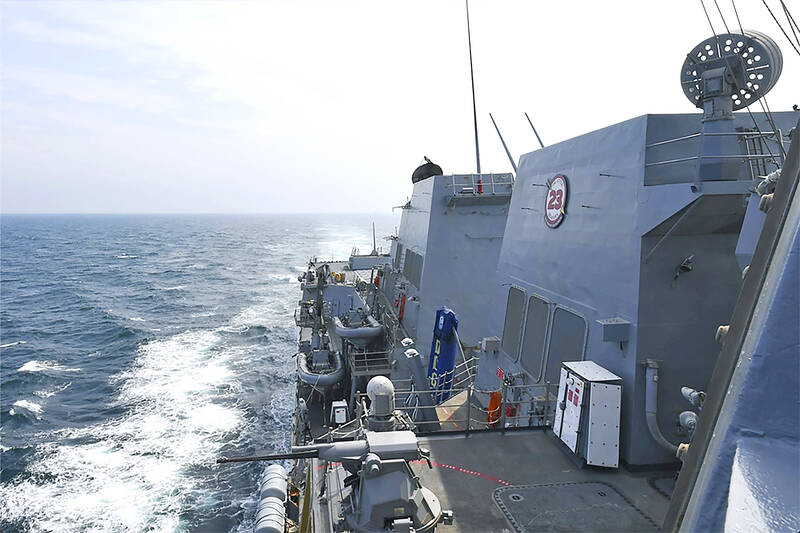Current and former US military leaders are increasingly urging Washington to abandon its long-standing policy of “strategic ambiguity” to counter Beijing’s attempts to change the “status quo” in the Taiwan Strait, Nikkei Asia reported on Friday.
“Strategic ambiguity has had its day and it’s time to move to strategic clarity,” retired admiral Harry Harris, former commander of the US Indo-Pacific Command, told the magazine on the sidelines of the Global Energy Security Talks in Tokyo.
“The Taiwan Relations Act calls for a peaceful resolution and calls for the status quo,” Harris said. “China has changed the status quo and is acting belligerently with regard to Taiwan, so that obligates us to do certain things to help Taiwan.”

The Arleigh Burke-class guided-missile destroyer USS Halsey conducts routine underway operations while transiting the Taiwan Strait on May 8.
Photo: Mass Communication Specialist Third-class Ismael Martinez, US Navy via AP
The act stipulates that peace and stability in the region are in the “political, security and economic interests of the US,” and that the US president and the US Congress must take “appropriate action” should those interests be put at risk, he said.
US President Joe Biden has said four times that his administration would defend Taiwan, Harris said.
“We should take him at his word. He is our commander-in-chief,” he said.
Harris’ successors as commanders of the US Indo-Pacific Command, retired admirals Philip Davidson and John Aquilino, have both testified in Congress that strategic ambiguity had served the US well, Nikkei Asia reported.
However, Commander of the Indo-Pacific Command Admiral Samuel Paparo did not defend the policy of ambiguity or use the term to describe the US’ stance toward Taiwan during his confirmation hearing earlier this year, the magazine said.
“There is no ambiguity for the joint force,” he said. “There is just the mission clarity contained within the Taiwan Relations Act that the [US] Department [of Defense] will aid Taiwan’s ability to defend itself.”
Asked if he meant preparing US regional forces under his command for “every potential,” including combat, Paparo said: “Yes sir. Clarity and mission focus.”
Separately, he told Nikkei Asia during an interview last month that the US closely observed Beijing’s military drills conducted shortly after President William Lai’s (賴清德) inauguration.
“We watched it. We took note. We learned from it. And they helped us prepare for the future,” he said.
He said he was confident the US and its allies would defeat China in a conflict.
However, Jeremy Furchtgott, director of Washington-based consultancy Baron Public Affairs and leader of the firm’s China practice, said that embracing strategic clarity risks forcing China into a corner.
“If the goal is conflict, the US should signal clarity. If the goal is to freeze the current situation, there should be ambiguity and mixed messages,” he told Nikkei Asia.
Source: Taipei Times - 2024/06/09




















